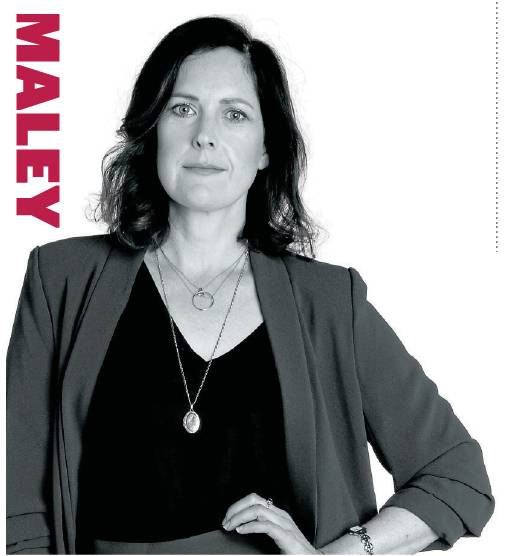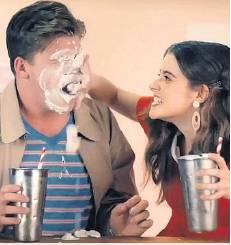Beneath the milkshake a bizarre, dangerous coyness about consent
JACQUELINE MALEY
Sexual assault and abuse are crimes with devastating consequences, and yet the federal government’s much-derided ads for young people couldn’t even use the words themselves.
It may be time to redeploy the novelty giraffe. Healthy Harold – an Australian life education icon – used to be engaged to visit schools to talk to children about respectful relationships, bullying, drugs and alcohol. Harold combined a long neck with a pleasant demeanour, and his popularity was such that no one (at least not at my school) ever thought to ask why a giraffe, exactly, was talking to us about such grave matters. The basis of Harold’s expertise was unclear but his enthusiasm was evident, and that was enough. A cursory internet search shows Harold’s popularity seems to have tailed off since his heyday in the 1980s and ’90s – back when ‘‘stranger danger’’ was a thing and few people thought to educate children and young people about the far greater danger of men they know. The federal government’s ‘‘milkshake’’ ad – which purported to teach young people about sexual consent through the metaphor of a milkshake – made Harold look good. The ad was released last week to such great derision that it was quickly removed from the government website where it premiered. It was notable for not using the word consent, let alone sex or assault.
He may have been a terrestrial mammal and a ruminant, but Harold did, occasionally, name the things he was trying to educate us about, rather than dance around them modestly. He never used confounding metaphors and he didn’t make girls the bad guys for the sake of making a point.
One of the most bizarre elements of the milkshake ad was that it had the girl forcing her milkshake on the boy.
Are we really so afraid of hurting men’s feelings that we don’t like to remind them they are the ones who tend to commit sexual assault?
It’s a funny old thing because in this country we have a noble tradition of bleak and blunt public health advertisements. Previous campaigns about seatbeltwearing, drink-driving and smoking have occasionally been so brutal they have been tough to watch. The ones about drinkdriving have no qualms about shaming the perpetrator.
A 2015 anti-drink driving campaign funded by the West Australian government had the slogan ‘‘Drink-driving – grow up’’. Another advertisement ended with a bloke being pulled over by the police after driving drunk. ‘‘Only a little bit over? You bloody idiot,’’ reads the message on the screen.
Anti-smoking ads are slightly more sensitive because they involve addiction, and there is no point in shaming addicts. But they emphasise the harms of the deadly habit – using cancer patients with their tongues cut out, or who have had a tracheotomy. They have dying smokers speak of their regrets, and how they won’t live to see their children grow up.
Why the sudden coyness when it comes to consent?
Sexual assault and abuse are crimes with devastating consequences. The resulting trauma can destroy a person’s life. Domestic violence is at epidemic levels in this country. Doesn’t sexual assault deserve the same serious treatment as other threats to public safety?
Kindergarteners and even preschoolers are educated on the concepts of private parts, saying no, and not keeping secrets that are ‘‘yucky’’.
One of the fundamental principles of personal-safety education for very young children is that you should call body parts by their anatomical names. Nothing cutesy or euphemistic. This is done so children will literally have the language, if they need it, to talk about the things we pray won’t happen to them.
One of the things that struck me watching the milkshake advertisement, which is bizarrely jokey and slapstick in its tone, is how it treats consent as a negotiation, as something one party acquiesces to.
How about teaching boys that if consent has to be negotiated, she probably doesn’t want to do it? How about teaching them about consent using the words which pertain to it, words like sex and assault?
How about inculcating young people in the idea of ‘‘enthusiastic consent’’ – because who wants to have sex with someone who isn’t consenting extremely enthusiastically to it?
I suspect one reason such a program hasn’t been rolled out is because it alludes to female pleasure, and the idea that girls should expect and desire it for themselves in their sexual lives.
Enthusiastic consent does away with the idea of the blushing young girl who has to be coaxed over the line. She becomes an active participant in her own sex life.
As a society, we still find that confronting, even as we continue to sexualise very young girls in the media and beyond.
How often do we tell our daughters to protect themselves? A lot.
How often do we tell them to choose a partner who will prioritise their pleasure and wellbeing? Not so often.
The other thing that is desperately needed is widespread consent education tailored to young men.
We don’t have public-awareness campaigns advising law-abiding motorists to do everything they can to avoid being on the road with a drunk driver. We use advertisements to shame the would-be drunk drivers into not doing it in the first place.
We remind them of the consequences – both for themselves and potential victims – of doing the harmful thing. We make them feel like it’s a shameful and anti-social thing to do.
The #notallmen brigade on Twitter and beyond may find this triggering, but that’s too bad. As one of my favourite March4Justice banners read: ‘‘Not all men? Well it was fookin’ one of yas.’’
Maybe put that banner in Healthy Harold’s hand (paw?) and march him into high schools.
It couldn’t be any worse than the milkshake message.
Jacqueline Maley is a senior writer.

